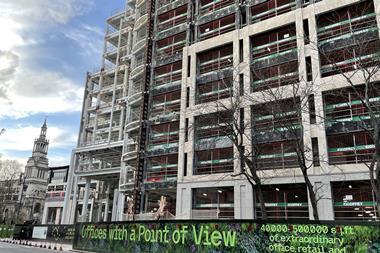What’s that I spy? A bear heading into the woods clutching a toilet roll? Sorry, say that again. The Pope is… is Catholic?

The ‘revelation’ via the leaked Pandora Papers that the rich and powerful buy property through offshore vehicles won’t be news to many in the property industry. Nor will the fact that many do so to mask their identities, avoid tax or launder money, not to those who have read Property Week over the past few years, anyway.
Way back in 2015, we ran an investigation asking: ‘Just how dirty is offshore money?’ (The answer? Pretty dirty, particularly in some jurisdictions). Last August, we covered a damning report that accused agents of enabling the flow of dirty Russian money into the UK.
Campaigners have long called for tougher regulation, harsher sanctions and greater transparency in the use of offshore vehicles to invest in UK property. As we report this week, those calls have grown louder in the wake of the Pandora Papers. Will they be heeded this time?
Don’t hold your breath. One problem is that politicians – more than 330 from 91 countries – are among those who have used such tax havens. Former prime minister Tony Blair and his wife Cherie reportedly saved themselves a tidy £312,000 in stamp duty on a £6.45m London townhouse by acquiring it through the purchase of an offshore vehicle. Why would anyone axe something they themselves benefit from?
Another problem is that owning assets via offshore vehicles is not illegal and, indeed, there are sometimes perfectly legitimate reasons to do so.
However, there can also be highly dubious reasons – such as hiding the identity of criminals or money laundering – and the practice is seen by many as unethical, especially viewed through the 1970s-tinted lens of 2021. It certainly doesn’t sit well that Sir Philip Green’s wife went on a property buying spree just as BHS was on the brink of collapse.
The Greens’ behaviour is no great surprise. What has raised a few eyebrows is news that The Crown Estate apparently bought an office block in Mayfair from a British Virgin Islands-registered company owned by the Azerbaijani ruling family, which has been linked with human rights abuses and corruption. It insists it did its due diligence at the time but adds that now, “given the potential concerns raised, we are looking into the matter”.
Let’s hope others do the same, regardless of whether the Pandora Papers prompt the government to do what it has hitherto failed to and tighten up the rules.
The Pandora Papers are a timely reminder of how disliked and mistrusted the property industry remains, and what an easy target it is. They are also a wake-up call that the industry needs to take greater care when it comes to how, where and with whom it does business.
These days, transparency is seen as synonymous with integrity, a lack of transparency as evidence of wrongdoing. It is no good simply complying with the letter of the law. Companies need to operate within the spirit of it, too. With use now regarded as abuse, anyone claiming to have brilliant ESG credentials risks undermining those credentials and being accused of hypocrisy if they are seen to be using offshore tax havens.
And as more of the Pandora Papers are leaked, make no mistake: those that have used them will be seen.





























No comments yet